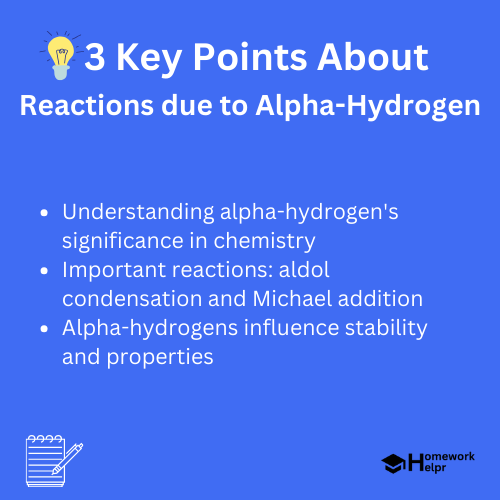📝 Summary
The term alpha-hydrogen refers to the hydrogen atoms attached to the alpha-carbon, which is adjacent to a functional group. These hydrogen atoms are notably weakly acidic, participating in key reactions such as aldol condensation, Michael addition, and dehydration reactions. The significance of alpha-hydrogens extends beyond organic synthesis; they aid in developing complex organic molecules and offer insights into reaction mechanisms and chemical stability. Understanding these reactions is crucial for students of organic chemistry and has widespread applications in medicine, agriculture, and material science.
Reactions Due to Alpha-Hydrogen
The term alpha-hydrogen refers to the hydrogen atom that is attached to the carbon atom adjacent to a functional group. Understanding the reactions involving alpha-hydrogens is crucial for students of organic chemistry, as these reactions play a significant role in organic synthesis and the formation of various compounds. In this article, we will delve into the various aspects of alpha-hydrogens, including their definition, the types of reactions they undergo, and their significance in organic chemistry.
Understanding Alpha-Hydrogen
To grasp the concept of alpha-hydrogens, it‚’ essential first to understand what is meant by an alpha-carbon. The alpha-carbon is the first carbon atom that is attached directly to a functional group, such as a carbonyl. The hydrogen atoms attached to this alpha-carbon are referred to as alpha-hydrogens. The significance of alpha-hydrogens lies in their tendency to participate in various chemical reactions, primarily due to their acidity.
Definition
Alpha-carbon: The carbon atom directly connected to a functional group in an organic compound. Functional group: A group of atoms in a molecule responsible for its characteristic chemical reactions.
Examples
In acetic acid (CH‚ÇÉCOOH), the carbon atom adjacent to the carboxyl group (-COOH) is the alpha-carbon. The hydrogens attached to this carbon (CH‚ÇÉ) are alpha-hydrogens.
Acidity of Alpha-Hydrogens
One of the remarkable features of alpha-hydrogens is their weakly acidic nature. When subjected to reactions, these hydrogen atoms can be abstracted (removed) to form enolates, ions that are critical in many chemical processes. The acidity of these hydrogens arises from the stability of the resulting enolate ion, which benefits greatly from resonance.
For example, in a compound such as acetaldehyde (CH‚ÇÉCHO), the hydrogen atom on the alpha-carbon can be removed to yield an enolate ion. This transformation is often represented as:
$$ text{R-CH}_2text{-CO}-H rightarrow text{R-CH}^-text{-CO} + text{H}^+ $$The enolate is stabilized by resonance, allowing it to delocalize negative charge. This phenomenon contributes significantly to subsequent reactions.
Definition
Enolate: A resonance-stabilized anion resulting from the deprotonation of a ketone or aldehyde at the alpha position. Resonance: A concept in chemistry where a molecule or ion can be represented by two or more valid Lewis structures.
Types of Reactions Involving Alpha-Hydrogens
Alpha-hydrogens take part in several important reactions in organic chemistry. Understanding these reactions will aid in predicting the outcomes of various organic syntheses. Let‚’ explore a few notable reactions:
- aldol condensation
- Michael addition
- Dehydration Reactions
1. Aldol Condensation
Aldol condensation is a reaction that involves the formation of a β-hydroxy aldehyde or ketone from two molecules of carbonyl compounds. In this process, an alpha-hydrogen is removed from one molecule, forming an enolate. This enolate then attacks the carbonyl carbon of another molecule, leading to the formation of a β-hydroxy carbonyl (aldol). The aldol product can undergo dehydration to yield an α,β-unsaturated carbonyl compound:
$$ text{R-CH}_2text{C(=O)-R’} + text{R-CHO} rightarrow text{R-CH}_2text{C(OH)(R’)} rightarrow text{R-CH}=text{C(R’)-C(=O)-R’} $$
2. Michael Addition
Michael addition is another critical reaction where alpha-hydrogens play a vital role. A nucleophile (often an enolate) adds to an Œ±,Œ≤-unsaturated carbonyl compound. Here, the alpha-hydrogen’s acidity is essential as it allows the generation of an enolate that can attack the carbon in the unsaturated system, resulting in a stable product.
Examples
When an enolate derived from acetone attacks an α,β-unsaturated ketone like methyl vinyl ketone, a Michael adduct is formed.
Definition
Nucleophile: A species that donates an electron pair to form a chemical bond in a reaction. α,β-unsaturated compound: A compound containing a double bond between the alpha and beta carbons adjacent to a carbonyl group.
3. Dehydration Reactions
Dehydration reactions are also influenced by the presence of alpha-hydrogens. In the case of the aldol condensation mentioned earlier, after formation of the β-hydroxy ketone, a dehydration step occurs. This reaction leads to the formation of an α,β-unsaturated compound, which is more stable and more reactive in further chemical processes.
❓Did You Know?
Did you know that alpha-hydrogens can also influence the physical properties of organic compounds, such as boiling point and solubility? This is due to their involvement in hydrogen bonding interactions.
Significance of Alpha-Hydrogen Reactions in Organic Chemistry
The reactions involving alpha-hydrogens are significant for several reasons:
- They allow for the formation of complex organic molecules from simpler ones.
- They are essential in designing synthetic pathways in pharmaceutical chemistry.
- They provide insights into reaction mechanisms and stability of compounds.
Furthermore, understanding these reactions helps chemists develop new reactions and products that can have wide applications in various fields such as medicine, agriculture, and materials science.
Conclusion
In conclusion, the study of reactions due to alpha-hydrogens is a fundamental aspect of organic chemistry. These reactions facilitate the transformation of simple molecules into complex structures and enhance our understanding of chemical processes. Through mechanisms like aldol condensation, Michael additions, and dehydration reactions, alpha-hydrogens contribute significantly to the diverse reactions within organic compounds. As students continue their journey in chemistry, an appreciation of the role of alpha-hydrogens will provide valuable insights into both academic and practical applications of this vital subject.
Related Questions on Reactions due to Alpha-Hydrogen
What are alpha-hydrogens?
Answer: They are hydrogen atoms attached to alpha-carbons.
Why are alpha-hydrogens significant?
Answer: They participate in key organic reactions.
What reactions involve alpha-hydrogens?
Answer: Aldol condensation, Michael addition, dehydration reactions.
How do alpha-hydrogens affect physical properties?
Answer: They influence boiling point and solubility.
